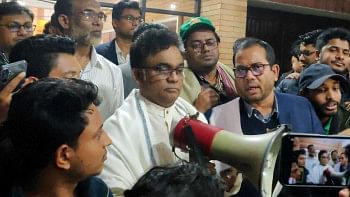Implement at least one taskforce recommendation

Education and Planning Adviser Wahiduddin Mahmud said the recommendations of the taskforce committee have been handed over to the chief adviser, and all advisers were asked to choose at least one recommendation that can be implemented during their tenure.
"No other better way is there to implement the recommendations of the taskforce," he said.
The adviser made these comments yesterday at a press conference organised at the National Economic Council in Dhaka's Agargaon area to present a report on the recommendations made by the taskforce under the Planning Ministry.
The taskforce was formed on September 10 last year to develop strategies for boosting the economy and mobilising resources for equitable and sustainable development.
The 12-member committee submitted its report to the interim government last week.
Referring to a similar taskforce in the 1990s, Mahmud said it had recommended many good measures, but none were implemented.
"It would not be bad if at least one recommendation for every ministry could be implemented," he said.
The interim government will categorise the recommendations into those that can be implemented in the short term and those requiring long-term execution, he said.
It will implement the short-term recommendations and initiate some long-term measures, which will be transferred to the next political government for execution, Mahmud, also a renowned economist, added.
The government has already started taking steps aligned with some of the taskforce recommendations, he said.
For instance, it is working to improve technical and vocational education, which has been largely neglected, he added.
"Around 60 percent of our secondary students should go into technical education, while the remaining 40 percent should pursue general education. But the current situation is just the opposite, and even worse," he said.
Social auditing can help ensure that people receive public sector services, the adviser noted.
The efficiency of one-stop services for attracting investment needs substantial improvement, as their execution involves multiple entities, leading to bureaucratic delays and complexities for investors, said KAS Murshid, chairman of the taskforce committee.
The Bangladesh Investment Development Authority should be solely responsible for executing one-stop services, he said.
A separate one-stop service can be introduced to cater for micro, small, and medium enterprises, he added.
A socially recognised degree should be introduced to remove the stigma surrounding vocational and technical education, said Murshid, who is also a former director general of the Bangladesh Institute of Development Studies (BIDS).
To meet public expectations of the interim government, service providers must change their mindset to improve service delivery, said Syed Nasim Manzur, a member of the taskforce.
He called for adjusting exchange rates by analysing the existing currency basket.
A new arbitration act is necessary, particularly for resolving issues related to foreign direct investment, he added.
Commercial banks should be strengthened through robust regulations, internal audits, and strict compliance, said Fahmida Khatun, executive director of the Centre for Policy Dialogue (CPD).
The autonomy of the central bank must be ensured, as it has weakened over the years, she said.
The Financial Institutions Division, which was created for a different purpose, should be abolished to strengthen Bangladesh Bank's autonomy, she said.
She also recommended enhancing the Bangladesh Financial Intelligence Unit to combat money laundering.
Other members of the taskforce -- Rumana Haque, a professor of economics department at Dhaka University; Monzur Hossain, research director of the BIDS, and AKM Fahim Mashroor, CEO of bdjobs.com -- also talked at the event.


 For all latest news, follow The Daily Star's Google News channel.
For all latest news, follow The Daily Star's Google News channel. 



Comments